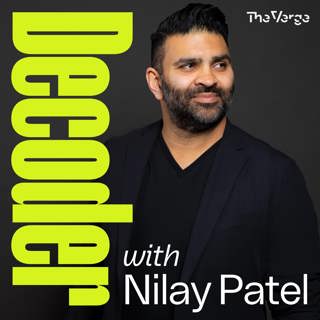
Land of the Giants: Facebook gets a facelift
This week, we're sharing the first episode of Land of the Giants: The Facebook/ Meta Disruption. Long before Mark Zuckerberg renamed Facebook Meta and made an unprecedented pivot into the metaverse, he invented a feature that turned Facebook into a social network behemoth. The News Feed, which put your friends’ status updates onto your homepage, changed the way we interact online. It was a strong statement of Zuckerberg’s values: that connecting, and sharing, at scale would be de-facto good for the world. It was also his first public controversy. Follow Land of the Giants to get new episodes every Wednesday. Learn more about your ad choices. Visit podcastchoices.com/adchoices
14 Jul 202228min

How arson led to a culture reboot at Traeger, with CEO Jeremy Andrus
Happy Fourth of July to our listeners in the States. Decoder is only a year old, but we’ve decided a Decoder tradition is that every summer, we’re going to do an episode about the outdoor grill industry, which is gigantic and growing. Last year, I talked to Roger Dahle, the CEO of Blackstone Products, a griddle company that blew up on TikTok and actually went public a few months after we talked. This year, I’m talking to Jeremy Andrus, the CEO of Traeger, which makes beloved wood pellet smokers with all sorts of features — the high-end models even have cloud connectivity so you can control them from your phone. Traeger also recently went public; the company says it will book between $800–850 million in revenue this year. The Traeger story is fascinating: the company was around for 27 years and not growing very much when Jeremy bought it with the help of a private equity firm and became the CEO. He had no background in cooking; he had previously been CEO of Skullcandy, the headphone brand. His early run as CEO of Traeger was a bit of a nightmare, culminating in an arson of a truck at one of Traeger’s warehouses. Jeremy responded by cleaning house, replacing most of the team, and moving the company from Oregon to Utah. Since then, Traeger has grown its revenue by 10 times and hopes to close in on a billion dollars in revenue soon. But, it has all the challenges that come along with shipping big, heavy hardware products through the supply chain crisis, looming recession, and changing consumer behavior as one version of the pandemic seems to be ending and people are spending their money on travel instead of home goods. Jeremy was game to talk about all of that; we really got into it. Links: How Traeger's CEO Cleaned Up a Toxic Culture Jeremy Andrus Found Success With Skullcandy. Now He Hopes To Do It Again With Traeger Grills. Traeger buys wireless thermometer company Meater Jeremy Andrus Found Success With Skullcandy. Now He Hopes To Do It Again With Traeger Grills. Traeger's stock opens 22% above IPO price, to value the grill market at $2.6 billion Transcript: https://www.theverge.com/e/22953717 Credits: Decoder is a production of The Verge, and part of the Vox Media Podcast Network. Today’s episode was produced by Creighton DeSimone and Jackie McDermott and it was edited by Callie Wright. The Decoder music is by Breakmaster Cylinder. Our Sr Audio Director is Andrew Marino and our Executive Producer is Eleanor Donovan. Learn more about your ad choices. Visit podcastchoices.com/adchoices
4 Jul 20221h 15min

TSA’s chief innovation officer on surveillance, security lines, and surrendering to PreCheck
I’m old enough to remember what it was like to fly before 9/11 — there were no TSA lines, there was no PreCheck, and there certainly wasn’t any requirement to take off your shoes. In fact, there wasn’t any TSA at all. But 9/11 radically changed the way we move through an airport. The formation of the new Department of Homeland Security and the new Transportation Security Administration led to much more rigorous and invasive security measures for travelers trying to catch their flight. This year is the 20th anniversary of the Department of Homeland Security and the TSA, and I think it’s safe to say that nobody enjoys waiting in the airport security line. And in the post-9/11 world, things like PreCheck are the great innovation of the department. At least according to Dan McCoy, who is the TSA’s chief innovation officer, who told me that PreCheck is “a hallmark government innovation program.” But what do programs like PreCheck and the larger surveillance apparatus that theoretically keep us safe mean for the choices we make? What do we give up to get into the shorter security line, and how comfortable should we be about that? This week, The Verge launches Homeland, our special series about the enormous influence of the Department of Homeland Security and how it has dramatically changed our country’s relationship with technology, surveillance, and immigration. So we have a special episode of Decoder with Dan McCoy to see where the TSA fits into that picture. Links: Read more stories from the Homeland series Transcript: https://www.theverge.com/e/22945989 Credits: Decoder is a production of The Verge, and part of the Vox Media Podcast Network. Today’s episode was produced by Creighton DeSimone and Jackie McDermott and it was edited by Callie Wright. The Decoder music is by Breakmaster Cylinder. Our Sr Audio Director is Andrew Marino and our Executive Producer is Eleanor Donovan. Learn more about your ad choices. Visit podcastchoices.com/adchoices
29 Jun 20221h 10min

How Mercedes-Benz CEO Ola Källenius is refocusing for an electric future
Mercedes-Benz CEO Ola Källenius became CEO in 2019 but has been working for Mercedes since 1993 in almost every part of the company. During that period, Mercedes spent time getting a lot bigger; the company famously merged with Chrysler for a time, forming a giant called DaimlerChrysler. But, over the past few years, it’s actually been getting much smaller and more focused. The Chrysler deal was undone and, just recently, Ola spun off the truck division into its own public company called Daimler Truck, leaving Mercedes-Benz to stand alone as a premium car brand. Car companies are either consolidating into giant conglomerates like Stellantis or shrinking and focusing like Mercedes. A lot of that is driven by the huge shift to electric vehicles and then, on top of that, to cars essentially becoming rolling computers. You’ll hear Ola refer to cars as “digital products” a lot — and to Mercedes itself as a tech company. (Actually, he says it’s a luxury and tech company.) Mercedes now has two new EVs, the EQS and the EQE, both of which have massive infotainment screens running Mercedes’ proprietary MBUX system, which even has its own voice assistant called Hey Mercedes. I had to ask Ola about Apple’s recent announcement that the next version of CarPlay would be able to take over every display in the car, including the instrument cluster. Apple showed a Mercedes logo on a slide during that presentation — so, is Ola ready to hand over his UI to Cupertino? Let’s find out. Ola Källenius, CEO of Mercedes-Benz. Here we go. Links: Mercedes-Benz Vision EQXX concept car traveled over 1,000 km on a single charge Mercedes-Benz unveils sporty, ultra-long-range vision EQXX electric concept car The six-figure Mercedes-Benz EQS gets a 350-mile range rating Daimler AG to rebrand as Mercedes-Benz on Feb. 1 Big automakers are breaking themselves apart to compete with Silicon Valley Mercedes-Benz reveals an electric G-Wagen concept for the future Transcript: https://www.theverge.com/e/22936880 Credits: Decoder is a production of The Verge, and part of the Vox Media Podcast Network. Today’s episode was produced by Creighton DeSimone and Jackie McDermott and it was edited by Callie Wright. The Decoder music is by Breakmaster Cylinder. Our Sr Audio Director is Andrew Marino and our Executive Producer is Eleanor Donovan. Learn more about your ad choices. Visit podcastchoices.com/adchoices
21 Jun 20221h 5min

How fandom built the internet as we know it, with Kaitlyn Tiffany
The Verge is all about how technology make us feel. Our screens and our systems aren’t inert, or neutral – they create emotions, sometimes the strongest emotions anyone actually feels in their day to day lives. I’ve been thinking about that a lot ever since I read a new book called Everything I Need I Get From You: How Fangirls Created the Internet by Kaitlyn Tiffany, who was a culture reporter at The Verge several years ago. The thesis of her book is that online fandom, specifically the hardcore fans of the British boy band One Direction, created much of the online culture we live in today on social platforms. And her bigger thesis is that fandom overall is a cultural and political force that can’t be ignored; it shapes elections, it drives cultural conversation, it can bring joy to people who feel lonely, and it can result in dramatic harassment campaigns when fans turn on someone. Links: Kaitlyn Tiffany Verge Archive One Direction Playlist Transcript: https://www.theverge.com/e/22930314 Credits: Decoder is a production of The Verge, and part of the Vox Media Podcast Network. Today’s episode was produced by Creighton DeSimone and Jackie McDermott and it was edited by Callie Wright. The Decoder music is by Breakmaster Cylinder. Our Sr Audio Director is Andrew Marino and our Executive Producer is Eleanor Donovan. Learn more about your ad choices. Visit podcastchoices.com/adchoices
14 Jun 20221h 5min

What unions could mean for Apple with Zoe Schiffer
Today is Apple’s Worldwide Developers Conference, or WWDC. It’s one of the biggest events of the year for Apple, one of the most important companies in the world. In fact, Apple is the most valuable company in the world, and it posted $18 billion in net profits in its first quarter — the most quarterly profit of any public company in history. So, as we go into another huge Apple event, I wanted to have Verge labor reporter Zoe Schiffer on to talk about something else that’s happening inside Apple: a brewing push by its retail employees to unionize, store by store, because they’re unhappy with their pay and working conditions. Zoe is really well-sourced; she has an inside look at this fight. So, she helps us explain how this all works and what it might mean. Links: Fired #AppleToo organizer files labor charge against the company Apple’s frontline employees are struggling to survive Apple hires anti-union lawyers in escalating union fight This is what Apple retail employees in Atlanta are fighting for First US Apple Store union election set for June 2nd in Atlanta Apple accused of union busting in new labor board filing Transcript: https://www.theverge.com/e/22917648 Credits: Decoder is a production of The Verge, and part of the Vox Media Podcast Network. Today’s episode was produced by Creighton DeSimone and Jackie McDermott and it was edited by Callie Wright. The Decoder music is by Breakmaster Cylinder. Our Sr Audio Director is Andrew Marino and our Executive Producer is Eleanor Donovan. Learn more about your ad choices. Visit podcastchoices.com/adchoices
6 Jun 20221h 5min

How Ukraine’s wide use of cryptocurrency is playing out during the war
Michael is president of the Blockchain Association of Ukraine and founder of the Kuna Exchange, which lets people buy cryptocurrency and swap between them. Earlier this year, the Ukrainian government set up wallets on Kuna and other exchanges to accept donations to the war effort in crypto; in April, Bloomberg reported it had received over $60 million in crypto donations. What’s more, earlier this year Ukrainian President Volodymyr Zelenskyy also signed a virtual assets bill into law, which will recognize cryptocurrency as an asset in Ukraine when the war is over. As president of the Blockchain Association, Michael lobbied for this law, which you’ll hear him talk about — especially in the context of how little faith he has in the banking system. He says several times that, even before the war, it couldn’t be trusted and that people were already using a combination of crypto and dollars for large transactions instead of Ukraine’s actual currency, which is called the hryvnia. Links: Ukraine Readies NFT Sales as Crypto Donations Top $60 Million Ukraine's Zelenskyy Signs Virtual Assets Bill Into Law, Legalizing Crypto Crypto Goes to War in Ukraine Blockchain Association of Ukraine Russian tycoon Tinkov sells stake in TCS Group to billionaire Potanin The Bitcoin Boom Cypriot financial crisis The 2020 Global Crypto Adoption Index: Cryptocurrency is a Global Phenomenon Transcript: https://www.theverge.com/e/22902506 Credits: Decoder is a production of The Verge, and part of the Vox Media Podcast Network. Today’s episode was produced by Creighton DeSimone and Jackie McDermott. It was researched by Liz Lian and it was edited by Callie Wright. The Decoder music is by Breakmaster Cylinder. Our Sr Audio Director is Andrew Marino and our Executive Producer is Eleanor Donovan. Learn more about your ad choices. Visit podcastchoices.com/adchoices
24 Mai 20221h 7min

The videos that don’t work on YouTube and the future of the creator business, with Nebula CEO Dave Wiskus
One of our recurring jokes at The Verge is that every YouTuber eventually makes a video where they talk about how mad they are at YouTube. Whether it’s demonetization or copyright strikes or just the algorithm changing, YouTubers have to contend with a big platform that has a lot of power over their business, and they often don’t have the leverage to push back. On this episode of Decoder, I’m talking to Dave Wiskus, the CEO of two really interesting companies: one is called Standard, which is a management company for YouTubers, and the other is Nebula, an alternative paid streaming platform where creators can post videos, take a direct cut of the revenue, and generally fund work that might get lost on YouTube. What really stood out to me here is that Dave is in the business of making things: this conversation was really grounded in the reality of the creator business as it exists today and how that real business can support real people. You’ll hear it when we talk about Web3 and NFTs a little bit — Dave just thinks that stuff is bullshit, and he says so because it’s not a business that exists now. That’s an important dynamic to think about — and one for more platforms to take seriously. Links: Dave's subscriber tweet Nebula Transcript: https://www.theverge.com/e/22840704 Credits: Decoder is a production of The Verge, and part of the Vox Media Podcast Network. Today’s episode was produced by Creighton DeSimone and Jackie McDermott and it was edited by Callie Wright. The Decoder music is by Breakmaster Cylinder. Our Sr Audio Director is Andrew Marino and our Executive Producer is Eleanor Donovan. Learn more about your ad choices. Visit podcastchoices.com/adchoices
17 Mai 20221h 13min






















